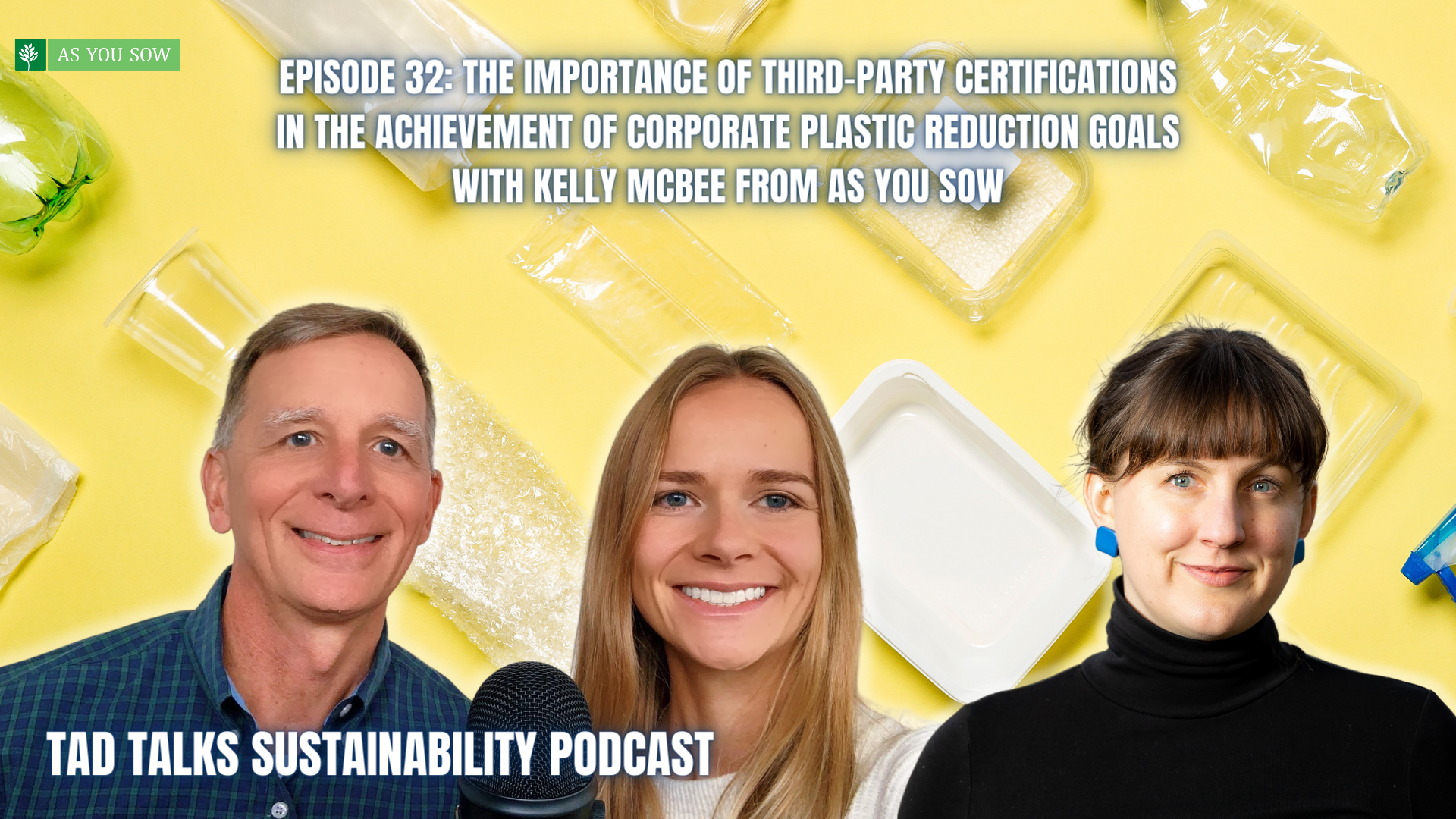Episode 32: Incorporating the Circular Economy Mindset into Product Packaging with Kelly McBee from As You Sow
Click the links below to listen to the full episode
Optimizing product packaging is essential for reducing waste and driving the circular economy. In this episode, Tad and Julianna sit down with Kelly McBee, Circular Economy Sr. Coordinator at As You Sow, to discuss the mission of As You Sow, the Corporate Plastic Pollution Scorecard they developed to rank companies on their progress toward plastic goals, how companies can get better scores in the future, why third-party certifications are so important to the achievement of corporate plastic reduction goals, and what’s next for As You Sow.
Interested in submitting a question for Tad to answer on an upcoming episode? Type your question into the box at the bottom of the page!
As You Sow came out with a Corporate Plastic Pollution Scorecard where you ranked companies on their progress toward their goals around plastic. Can you tell us more about this report and the key criteria that was used in scoring?
“This report was something As You Sow wanted to pursue, and why I was hired about five years ago to help develop, because the financial firms we were working with wanted greater clarity on which companies were really taking action to ensure that their plastic packaging was not becoming waste and really working to take the steps to create a circular economy versus those that might be lagging. So we developed this scorecard to give investors that picture. We have periodically done these types of reviews of companies, but our last scorecard was the most holistic where we received input from several different NGOs, from company representatives and other stakeholders in determining what the different aspects were for corporate action and how we could rank those. Ultimately, we ended up with quite a large metric ranking system. We have 44 metrics where we evaluate whether or not companies have taken that action. Those 44 metrics are split up into six pillars. There are things like design of packaging, use of recycled content, use of reusable packaging, packaging transparency, support for U.S. recycling infrastructure, and then support for extended producer responsibility.”
Do you have any recommendations for companies that have been scored, on how they can get better scores in the future? Are there any kind of recommendations or learnings that might have come out of this for you as you did the report?
“Absolutely, and it is so aligned with what you just said. It is incorporating that mindset of a circular economy into the original packaging design. It is changing the corporate mindset of responsibility for packaging to not just be up until the consumer purchases that item, but all the way until the packaging or that original product has its end of life and is either landfilled, recycled, incinerated, or polluted into the environment. So extending their responsibility and putting measures in place to make sure that the way that this package is handled aligns with the corporate value of sustainability. Truly adopting that circular economy mindset is something that we encourage companies to do. It's our number one recommendation. We would hark to companies like Unilever, whose CEO, Alan Jope, has repeatedly said and even put it in big letters in their sustainability report, “Our packaging is our financial responsibility.” Unilever backs that up with contributions to support recycling infrastructure and other projects. Looking internally is number one and asking, “What are we doing on our packaging? Where do we end our responsibility?”
I would also look at the areas of our scorecard where most companies did not score well. Those would primarily be on reusable packaging and on extended producer responsibility. What we looked at there was whether or not companies had goals to expand their use of reusable packaging or even a commitment to investigate reusable packaging. So a statement that they recognized this would increase the circularity of their business and they were willing to commit to the necessary finances and time to look into it or they were partnering with other organizations that could help them do that.
Then whether or not they were reporting on how much of their product packaging, if any, was in reusables, even if it was just a pilot. It's that type of comparable information that investors need in order to say, “Which actions are really making a difference? Which companies are actually investing in reusables versus just having one small pilot from their several hundred different brands?” Then on extended producer responsibility, I mentioned this public statement of commitment, but we're also looking at whether or not companies are supporting legislation that might level the playing field on packaging at its end of life. So something like an extended producer responsibility piece of legislation that charges fees on packaging to help ensure that there are funds available to capture it at its end of life. We have very excitedly seen four new pieces of legislation just in the last year and a half here in the U.S. pass Extended Producer Responsibility (EPR). We would love for that to happen at a national level. We're looking for companies to step up and be the leader on that.
Coca-Cola was the highest scoring company in our second scorecard, our most recent scorecard. That was due in large part to their commitment to capture a bottle or can for everyone that is sold and they are investing financially in making sure that it happens. We also worked with Coca-Cola to set a new reusable packaging goal. They were the first major company to set a reusable packaging goal. They said that 25% of their sales by 2030 would be sold in container free or reusable containers. So something like a fountain beverage, but also in a lot of their other markets they have refill systems of existing bottles. We also worked with Pepsi to later announce a similar goal. So we're moving in that direction of reusable packaging and true product stewardship.”
in the Corporate Plastic Pollution Scorecard, there are recommendations for all companies to require third-party certifications. Can you tell us more about why third-party certifications are so important in the achievement of corporate plastic reduction goals?
“Absolutely. This is huge for investors as well. Investors want to have assurance that the companies that they own shares of are not greenwashing their claims, but are actually verified in doing what they say they're doing. Investors don't have the ability to do that. So when claims are third-party verified by a group like GreenCircle Certified, it gives investors assurance that this is actually happening and it helps level the playing field for companies so that their claims are uniform in nature and unbiased.
A key part of a circular economy that I think people often forget is that it's not just putting the material in your recycling bin, but it then has to be sorted, bailed, reprocessed, and somebody has to buy that material and use it again in a package. Otherwise, that circle of resource use doesn't get closed and we don't achieve the sustainability that we want. So using recycled content when making a new product is incredibly important, but whether or not that recycled content is actually recycled versus maybe virgin material or something else, is crucial. Otherwise, it's not just the sustainability claims that are not being upheld there but companies could end up paying more for a material that's not what they actually intended to have purchased.”
MORE VIDEO CONTENT
ABOUT Kelly McBee
As Circular Economy Program Sr. Coordinator, Kelly works with companies to improve their circular economy operations, including limiting natural resource extraction and supporting robust repair, reuse, and recycling programs. Kelly specializes in sustainable consumer goods packaging, plastic pollution prevention, nurdles, and electronic waste.
Kelly is the author of As You Sow’s 2021 Corporate Plastic Pollution Scorecard and accompanying Scorecard Data Visualization Tool. Additionally, Kelly manages As You Sow’s Plastic Solutions Investor Alliance, an international coalition of more than 50 institutional investors with more than $2 trillion in combined assets, working to engage publicly traded consumer goods companies on the threats posed by plastic pollution and waste.
Prior to joining As You Sow, Kelly was a legislative analyst and advocate working to pass circular economy policies for the state of California. Kelly received her BA from University of California Davis, where she studied global and environmental health.
WE’RE ANSWERING QUESTIONS FROM OUR AUDIENCE!
Anonymously ask Tad a question about sustainability by typing your question in the box below.
We will answer your questions on an upcoming episode.







